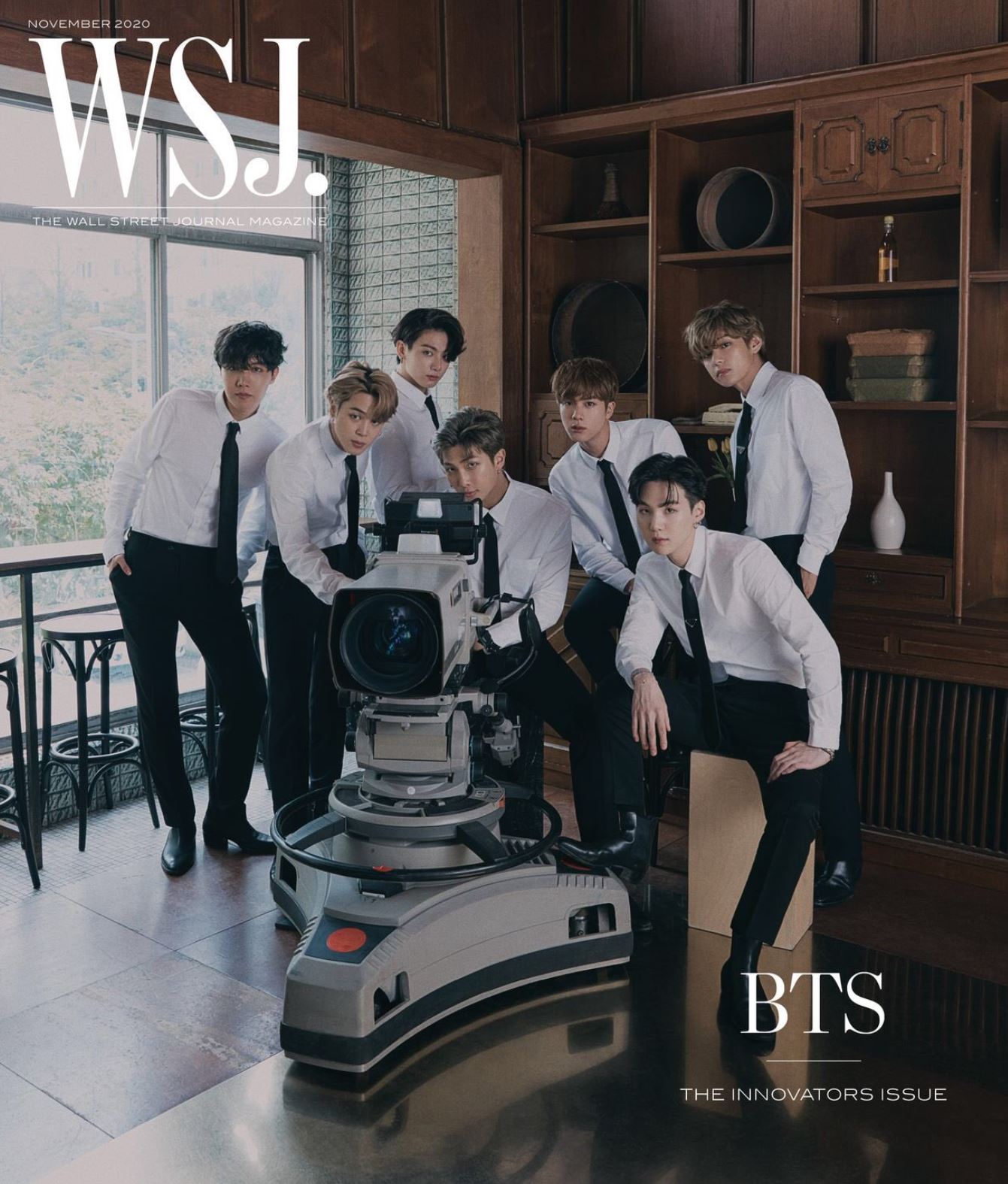BTS: Music Innovator of the Year



WSJ. Magazine has named BTS the Music Innovator of the Year in their annual Innovators issue. Before we get into that, I need to mention that the Television Innovator of the Year is Micaela Coel and if you haven’t watched I May Destroy You yet, well, it’s not like many of us are going anywhere any time soon with this pandemic so… add it to your holiday watch list. When you’re not listening to BTS. Because if you haven’t started by now, come on, isn’t it time?!
“Innovate” is the word I’ve been using all year to describe BTS. Back in June I posted an article titled “BTS Innovation” after their live virtual pay-per-view concert, Bang Bang Con: The Live, set a record in viewership. They followed that up with a two night virtual concert event in October, Map of the Soul: ON:E, that also broke records, their own records. They are constantly breaking records because they are constantly innovating, reimagining how to make music and more and delivering their music and more to as many people as possible, even in the midst of a global health crisis. So this Innovator of the Year award is 100% deserving. But, LOL, at the same time, it also benefits WSJ. Magazine. There is no doubt that sales of the BTS issue – with eight different covers capturing the band as a collective and each individual member – will be higher than they’ve seen in recent years, which goes back to my point in today’s open about PEOPLE Magazine’s Sexiest Man Alive. If they named BTS the Sexiest Men Alive, they’d make their sales targets and more.
That said, WSJ. Magazine is backing up their clout-chasing with a robust, well-researched profile that understands BTS’s ethos and frames their talent and their ambition through the lens of their personal culture and the global cultural forces that have at once shaped them and that they now influence by their popularity. Written by Eun-Young Jeong, this is a piece that pays equal attention to RM, Jin, Suga, j-hope, Jimin, V, and Jungkook as individuals and as a team. It takes BTS seriously, it takes each band member seriously, and it takes their work very, very seriously. This is what I appreciate most about the article – there is so much insight into their work process, their songwriting, their lyrics, and especially their work dynamic. So it’s a deep-dive but it’s also a 101 for those WSJ. readers who may not be familiar, and chances are there are many. The profile traces the band’s origins, within the framework of boy bands in general, dating back from the time of The Beatles and through the recent pop eras, to how BTS has defiantly transcended the stereotype of what people understand boy bands to be – contrived and manufactured and temporary. This is not BTS. As hard as it is for the uninformed to believe, each band member makes significant contribution to the music. And in the piece, Suga, j-hope, and RM speak about songwriting, about the importance of words, how much care goes into the language of the music and the lyrics, the precision in their lyrics. In particular I love what RM said about a writer’s pain:
“RM, who has credits on many of BTS's biggest songs, will dwell on a line from a movie or a passing scene, sometimes for years, before starting to work it into his lyrics. “[Writing songs] takes time for me,” says RM. “So it hurts, body and soul, when I have to throw one away.”
Any writer can relate to that feeling. It takes a writer to know it.
All of BTS’s members are now writing and pushing for their contributions to be featured more. That’s the other fascinating part about their collaborative method: there is competition. And competition, when competitors respect the boundaries and compete fairly, on equal terms, is good. Just like in sport. Athletes don’t improve without competition. Artists too can improve with productive competition. On their latest album, the band reveals that they all submitted their own melodies and lyrics during the development phase.
“For their new album, BTS members had made separate bids to feature melodies they had written as the album's lead song. Jimin describes that process as “painstaking and tearful”. Jungkook points out that the members weren't just competing against each other but against other composers who also submitted attempts to [their producer]. Jin alone sent him three different melodies. Suga made it to the finals. RM, though, chose to sit this one out. “The competition was too fierce,” he says.
To go back to the sports analogy, it’s like training camp, when multiple players are competing for one starting position but, ultimately, the team comes first, the loyalty is to the team, the unit as a whole. That’s the magic that has propelled BTS to the top – and inspired so much academic study about them as a team case study. Their team chemistry, complete with competition, is the driving force behind their success. And in show business, it’s a unique formula. Because certainly there are bands and bands with longevity but for the most part, in a band there is an acknowledged lead singer, a front-person, who occupies most of the spotlight. RM may be BTS’s recognised “leader” but Jin, Suga, j-hope, Jimin, V, and Jungkook are all equal in popularity and airtime. And if we’re going by boy band standards, BTS is in their seventh year; as we’ve seen, boy bands start to fray after a time. In BTS’s case they’re only getting stronger and stronger. This is why BTS is fascinating for group dynamic theorists. They’ve organically developed an ecosystem that strengthens the core while maintaining fulfilment for individual members – through a variety of ways; and clearly one of those ways is fostering beneficial competition.
To read the full WSJ. Magazine piece on BTS as the Music Innovator of the Year, click here.

